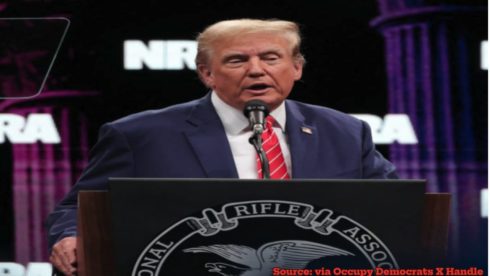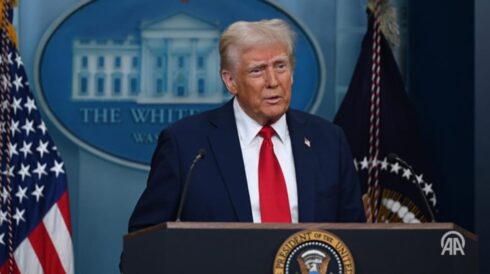US Presidential candidate Donald Trump has expressed a supportive stance towards cryptocurrency, emphasizing its potential and advocating for the rights of crypto users. His recent statements have made waves in the financial and political landscapes, marking crypto as a significant topic in the upcoming election.
Donald Trump, the US Presidential candidate and former President, has made it clear that he is open-minded about cryptocurrency and the burgeoning industry surrounding it. In a recent post on his social media platform, Truth Social, Trump emphasized the importance of the US leading in the cryptocurrency field. “The US must be the leader in the field and there is no second place,” Trump declared, signaling his intention to position America at the forefront of crypto innovation and regulation.
Trump’s remarks also highlighted his commitment to supporting the right to self-custody for the nation’s approximately 50 million crypto holders. “I am very positive and open-minded to cryptocurrency companies and all things related to this new and burgeoning industry,” Trump stated. This supportive stance is likely to resonate with a substantial segment of voters who are involved in or enthusiastic about the crypto market.
Crypto as a Key Election Topic
As the 2024 US Presidential election approaches, cryptocurrency has emerged as a pivotal issue, with Trump’s pro-crypto stance drawing significant attention. His comments suggest that crypto policy could become a defining element of his campaign platform.
In the context of the 2024 elections, cryptocurrency has become a major topic of discussion. While only a fraction of American voters currently use crypto, its influence on politics is substantial. According to a report by Washington-based Politico, cryptocurrency firms and advocacy groups are preparing to spend over $80 million on the upcoming elections. This substantial financial involvement underscores the growing importance of crypto in the political arena.
Trump’s endorsement of self-custody rights aligns with a broader movement advocating for greater personal control over digital assets. By supporting this right, Trump is addressing the concerns of millions of crypto holders who seek to maintain autonomy over their investments. This stance could attract voters who prioritize financial independence and innovation.
Impact on Voters and the Political Landscape
Trump’s pro-crypto declarations could significantly influence voter behavior and campaign strategies in the 2024 election. The intersection of cryptocurrency and politics is becoming increasingly pronounced, with potential implications for both regulatory policies and voter engagement.
The impact of Trump’s pro-crypto stance on voters and the political landscape could be profound. As cryptocurrency becomes a more prominent issue, candidates’ positions on crypto regulation and innovation are likely to influence voter decisions. Trump’s commitment to leading the US in the crypto sector and supporting self-custody rights presents a clear message to pro-crypto voters, potentially mobilizing a significant voter base.
Moreover, the financial contributions from cryptocurrency firms and advocacy groups to the 2024 elections highlight the sector’s growing political clout. With over $80 million expected to be spent, the influence of crypto on election outcomes cannot be underestimated. This financial power could shape campaign strategies and policy proposals, making cryptocurrency a central theme in the political discourse.
Donald Trump’s embrace of cryptocurrency and his advocacy for self-custody rights position him as a key player in the evolving relationship between digital assets and politics. As the election approaches, his pro-crypto stance may not only sway voters but also reshape the political landscape, underscoring the significance of cryptocurrency in the future of US policy and governance.
Decline in Cryptocurrency Usage: Federal Reserve Report
The Federal Reserve’s May 2024 report on the “Economic Well-being of U.S. Households” reveals a significant decline in cryptocurrency usage among adults. According to the report, only 7 percent of adults held or used cryptocurrency in 2023, a marked decrease from 12 percent in 2021. This 5 percentage point drop highlights a growing trend of skepticism or disinterest in digital currencies among the American public.
Several factors could be contributing to this decline. Market volatility, regulatory uncertainties, and high-profile legal challenges against major cryptocurrency platforms like Ripple and Coinbase may have eroded public confidence. Additionally, the broader economic context, including inflation and economic instability, might have influenced individuals’ investment behaviors, leading them to favor more traditional and perceived safer assets.
Trump’s Pro-Crypto Stance and Election Implications
U.S. Presidential candidate Donald Trump has publicly declared his support for cryptocurrency, indicating a significant shift in political attitudes towards digital assets. In a recent post on his Truth Social account, Trump expressed enthusiasm for the burgeoning cryptocurrency industry, emphasizing the need for the United States to lead in this field. He stated, “I am very positive and open-minded to cryptocurrency companies and all things related to this new and burgeoning industry. Our country must be the leader in the field and there is no second place.”
Trump’s pro-crypto stance is also evident in his advocacy for voters’ right to self-custody of their digital assets. His statements during rallies and on social media suggest that cryptocurrency policy could become a pivotal issue in the upcoming election. According to the Polymarket prediction platform, there is currently a 56% chance of Trump winning the U.S. election. This potential outcome could have significant implications for the regulatory environment surrounding cryptocurrencies, especially in light of ongoing SEC lawsuits against major industry players.
Legislative and Regulatory Landscape
The passage of the FIT21 crypto bill in one House of Congress marks a notable development in the legislative landscape for digital currencies. This bill represents a step towards establishing a more defined regulatory framework for cryptocurrencies, which could provide greater clarity and stability for investors and companies alike. However, the ongoing legal battles between the SEC and prominent cryptocurrency firms such as Ripple and Coinbase remain a critical factor that could influence future regulatory approaches.
The outcome of these lawsuits is likely to have far-reaching implications for the cryptocurrency market. A ruling against these companies could lead to stricter regulations and potentially hinder the growth of the industry in the U.S. On the other hand, a favorable outcome could bolster confidence and encourage further adoption and innovation. As the 2024 Presidential election approaches, the intersection of cryptocurrency policy and electoral politics will be an area of keen interest for stakeholders across the financial and political spectrum.














